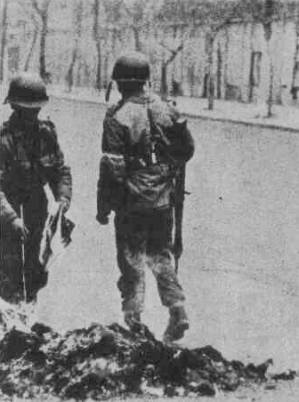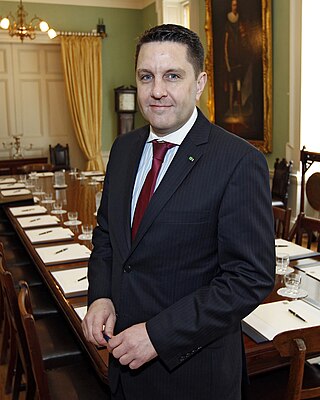
Kevin Christopher O'Higgins was an Irish politician who served as Vice-President of the Executive Council and Minister for Justice from 1922 to 1927, Minister for External Affairs from June 1927 to July 1927 and Minister for Economic Affairs from January 1922 to September 1922. He served as a Teachta Dála (TD) from 1918 to 1927.

Liam O'Flaherty was an Irish novelist and short-story writer, and one of the foremost socialist writers in the first part of the 20th century, writing about the common people's experience and from their perspective. Others are Seán O'Casey, Pádraic Ó Conaire, Peadar O'Donnell, Máirtín Ó Cadhain, and Seosamh Mac Grianna all of them Irish language speakers who chose to write either in Irish or English.
Events from the year 1926 in Ireland.
In Ireland, the state retains laws that allow for censorship, including specific laws covering films, advertisements, newspapers and magazines, as well as terrorism and pornography, among others. In the early years of the state, censorship was more widely enforced, particularly in areas that were perceived to be in contradiction of Catholic dogma, including abortion, sexuality and homosexuality. The church had banned many books and theories for centuries, listed in the Index Librorum Prohibitorum.

The Obscene Publications Act 1959 is an Act of Parliament of the United Kingdom Parliament, which significantly reformed the law related to obscenity in England and Wales. Before the passage of the Act, the law on publishing obscene materials was governed by the common-law case of R v Hicklin, which had no exceptions for artistic merit or the public good. During the 1950s, the Society of Authors formed a committee to recommend reform of the existing law, submitting a draft bill to the Home Office in February 1955. After several failed attempts to push a bill through Parliament, a committee wrote a viable bill, which was introduced to Parliament by Roy Jenkins and given royal assent on 29 July 1959, coming into force on 29 August 1959 as the Obscene Publications Act 1959. With the committee consisting of both censors and reformers, the actual reform of the law was limited, with several extensions of police powers included in the final version.
Germany has taken many forms throughout the history of censorship in the country. Various regimes have restricted the press, cinema, literature, and other entertainment venues. In contemporary Germany, the Grundgesetz generally guarantees freedom of press, speech, and opinion.
The Censorship of Publications Board is a formally independent but government-appointed board established by the Censorship of Publications Act, 1929 to examine books and periodicals that are for sale in the Republic of Ireland. It is governed by the Censorship of Publications Acts of 1929, 1946 and 1967. The Board has the authority to prohibit any book or periodical that they find to be obscene. This makes it illegal to buy, sell or distribute that publication in the Republic of Ireland. The Board prohibited a large number of publications in the past, including books by respected authors. However, since the 1990s it has not prohibited publications very often.
Prostitution in Ireland is legal. However, since March 2017, it has been an offence to buy sex. All forms of third party involvement are illegal but are commonly practiced. Since the law that criminalises clients came into being, with the purpose of reducing the demand for prostitution, the number of prosecutions for the purchase of sex increased from 10 in 2018 to 92 in 2020. In a report from UCD's Sexual Exploitation Research Programme the development is called ”a promising start in interrupting the demand for prostitution.” Most prostitution in Ireland occurs indoors. Street prostitution has declined considerably in the 21st century, with the vast majority of prostitution now advertised on the internet.
United States v. One Book Called Ulysses, 5 F. Supp. 182, is a landmark decision by the United States District Court for the Southern District of New York in a case dealing with freedom of expression. At issue was whether James Joyce's 1922 novel Ulysses was obscene. In deciding it was not, Judge John M. Woolsey opened the door to importation and publication of serious works of literature that used coarse language or involved sexual subjects.
The Committee on Obscenity and Film Censorship, better known as the Williams Committee, was a 1970s British Home Office committee chaired by Professor Bernard Williams. The task of the committee was to "review the laws concerning obscenity, indecency and violence in publications, displays and entertainments in England and Wales, except in the field of broadcasting, and to review the arrangements for film censorship in England and Wales".
Censorship in New Zealand has been present since around 1850 and is currently managed by the Classification Office under the Films, Videos, and Publications Classification Act 1993.
An obscenity is any utterance or act that strongly offends the prevalent morality of the time. It is derived from the Latin obscēnus, obscaenus, "boding ill; disgusting; indecent", of uncertain etymology. Generally, the term can be used to indicate strong moral repugnance and outrage in expressions such as "obscene profits" and "the obscenity of war". As a legal term, it usually refers to descriptions and depictions of people engaged in sexual and excretory activity.
In Ireland, "publication or utterance of blasphemous matter", defamatory of any religion, was a criminal offence until 17 January 2020. It was a requirement of the 1937 Constitution until removed after a 2018 referendum. The common law offence of blasphemous libel, applicable only to Christianity and last prosecuted in 1855, was believed to fulfil the constitutional requirement until a 1999 ruling that it was incompatible with the constitution's guarantee of religious equality. The Defamation Act 2009 included a provision intended to fill the lacuna while being "virtually impossible" to enforce, and no prosecution was made under it. The 2009 statute increased controversy, with proponents of freedom of speech and freedom of religion arguing for amending the constitution. After the 2018 constitutional amendment, a separate bill to repeal the 2009 provision and residual references to blasphemy was enacted in 2019 by the Oireachtas (parliament) and came into force in 2020. The Prohibition of Incitement to Hatred Act 1989, which includes religion among the characteristics protected from incitement to hatred, remains in force.

Book Censorship in Canada is primarily limited to the control of which books may be imported. Canada Border Services Agency is able to block materials considered to be inappropriate from entering the country, although this practice has become less frequent since the Canadian Charter of Rights and Freedoms was put into place.
Book censorship is the removal, suppression, or restricted circulation of literary, artistic, or educational material on the grounds that it is objectionable according to the standards applied by the censor. The first instance of book censorship in what is now known as the United States, took place in 1637 in modern-day Quincy, Massachusetts. While specific titles caused bouts of book censorship, with Uncle Tom’s Cabin frequently cited as the first book subject to a national ban, censorship of reading materials and their distribution remained sporadic in the United States until the Comstock Laws in 1873. It was in the early 20th century that book censorship became a more common practice and source of public debate. Throughout the 20th and early 21st centuries there have been waves of attempts at widespread book censorship in the US. Since 2022, the country has seen a dramatic increase of attempted and successful censorship, with a 63% rise in reported cases between 2022 and 2023, including a substantial rise in challenges filed to hundreds of books at a time. In recent years, about three-fourths of books subject to censorship in the US are for children, pre-teenagers, and teenagers.

Book censorship is the act of some authority taking measures to suppress ideas and information within a book. Censorship is "the regulation of free speech and other forms of entrenched authority". Censors typically identify as either a concerned parent, community members who react to a text without reading, or local or national organizations. Books have been censored by authoritarian dictatorships to silence dissent, such as the People's Republic of China, Nazi Germany and the Soviet Union. Books are most often censored for age appropriateness, offensive language, sexual content, amongst other reasons. Similarly, religions may issue lists of banned books, such as the historical example of the Catholic Church's Index Librorum Prohibitorum and bans of such books as Salman Rushdie's The Satanic Verses by Ayatollah Khomeini, which do not always carry legal force. Censorship can be enacted at the national or subnational level as well, and can carry legal penalties. In many cases, the authors of these books could face harsh sentences, exile from the country, or even execution.
Book censorship was carried out in several instances in Ireland between 1929 and 1998, with all remaining bans from that period having expired by 2010. However, the laws remained on the statute books and a book was banned again in 2016. Censorship was enacted by a 1929 act of the Irish Free State.

James O'Higgins Norman PC, MStJ, FRSA holds the UNESCO Chair on Tackling Bullying in Schools and Cyberspace at Dublin City University. He is the director of the National Anti-Bullying Research and Resource Centre, and a member of the Government of Ireland Advisory Council on Online Safety.

R v Penguin Books Ltd, was the public prosecution in the United Kingdom of Penguin Books under the Obscene Publications Act 1959 for the publication of D. H. Lawrence's 1928 novel Lady Chatterley's Lover. The trial took place over six days, in No 1 court of the Old Bailey, between 20 October and 2 November 1960 with Mervyn Griffith-Jones prosecuting, Gerald Gardiner counsel for the defence and Laurence Byrne presiding. The trial was a test case of the defence of public good provision under section 4 of the Act which was defined as a work "in the interests of science, literature, art or learning, or of other objects of general concern".
The Irish Vigilance Association was a society established in Ireland in 1911 under the auspices of the Dominicans. Its objective was to prevent the spread of "bad and unsavoury literature" by enrolling members in a "Good Literature Crusade". The "crusade" was directed against "immoral" literature and the perceived excesses of the English press, and was later extended to the cinema.






